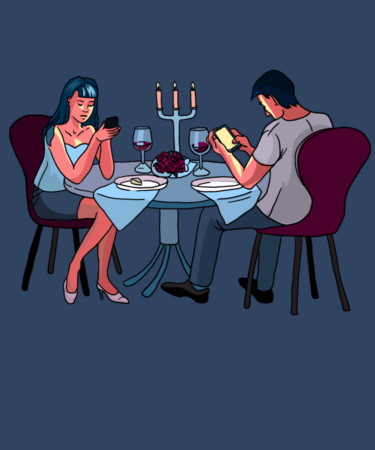On a recent chilly evening, Ron Boudreau stood behind the bar at the Jasper Murdoch Ale House at the Norwich Inn and surveyed his patrons. Locals and tourists filled the six stools and eight small tables in the cozy room at the historic Vermont establishment, and nearly all of them had a phone within hand’s reach.
“I can look down the bar and see three of four people looking at their smartphones, and at the tables entire families will be looking at their phones,” said Boudreau, 51, who has been a bartender for 33 years. “It’s kind of sad, really.”
He looks up at the ceiling. “Smartphones have ruined a lot of good bar arguments,” he says.
Boudreau recalls working at another Vermont bar, in a time before everyone carried a computer in their pocket, when strangers struck up conversations, and small talk turned into debates about whether or not the Red Sox won the pennant in 1979, or which actor uttered the immortal line, “We’ll always have Paris.”
“There would be occasions when people would have different opinions on certain topics, and when people could not come to an agreement they would make a bet,” Boudreau explains. “They would need someone to witness the actual bet, so we’d write the bet on a bar napkin, each patron would sign it, they’d hand me their money and I’d fold it in the napkin and tuck it up in a tile in the ceiling. It would stay there until we found out the correct answer, and the person who won would come in and claim their money.”
So many bets were being placed that Boudreau says the ceiling was covered with white napkins and money hanging from them. He began to see a change about seven to 10 years ago, when people started checking their phones immediately to settle a dispute. Though he says a few people would still make bets – agreeing to keep their phones in their pockets until the wager was made – eventually bar bets went the way of pagers and fax machines.
The disappearance of friendly bets over a pint of beer may seem inconsequential, but the change is emblematic of a much broader cultural shift away from personal interactions. A 2015 study by Deloitte found that, on average, Americans look at their cell phones 46 times per day; a whopping 81 percent look at their phones while dining out. Americans are so addicted to looking at their cell phones that studies have been conducted to measure people’s anxiety when their phone use is restricted, and there is now a new 12-step program called Internet and Tech Addiction Anonymous.
Boudreau doesn’t need to conduct a study to see how technology has transformed bars.
“What we’ve lost with the advent of smartphones is the camaraderie of people starting up conversations,” he says. “They’ve changed the atmosphere, people are just more to themselves. There’s so little eye contact made, people are focused on their phone and in their own little comfort zone.”
For many, cell phones have become a kind of defense shield, especially in bars. It’s a double-edged sword, though. Checking Facebook or Instagram over a glass of wine may keep undesirable strangers at bay, but for those who go out hoping for a bit of human contact and a friendly chat, cell phones can be an insurmountable barrier.
“As a bartender it’s one of my jobs to bring people together,” Boudreau says. “I can tell you of countless times I’ve introduced people, and it’s uncanny the connections folks make just sitting at a bar.”
Boudreau tells the story of just such a connection that was made the other night. Two sisters and their elderly mother, who lives in Norwich, were sitting at the bar next to a family from another Vermont town. He introduced them, and it turns out the grandfather of the two sisters was the family doctor for the father of the visiting family. Boudreau says that’s just one example of absurd connections people make from all over the world.
“In the setting I’m in, it’s easy for me to start a conversation with people,” Boudreau says. “I may know something about both of them that they have in common, and that starts a conversation. Then a person in the corner will say, ‘I’ve been there’ or something like that, and before you know it everyone at the bar will be chatting and having a good time.”
He added that if he doesn’t get his customers talking, they all want to talk to him.
“It’s a form of self-preservation,” Boudreau says with a laugh.
And in case you haven’t Googled it already, the Red Sox did not win the pennant in 1979, and Humphrey Bogart uttered the words “We’ll always have Paris” in the 1942 classic, “Casablanca.”
